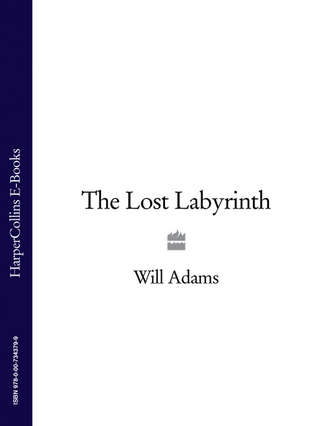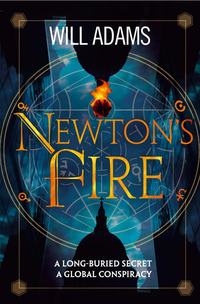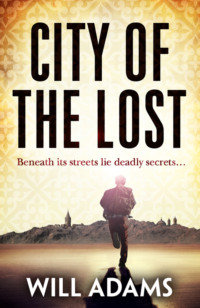
Полная версия
The Lost Labyrinth
He let go of her, stepped away, returned to his chair, sat back down and folded his hands once more in his lap. ‘Narcissistic, am I?’ he asked. ‘Or is it simply that I am beautiful?’
TWO
I
The Kastelli Hotel, Athens, Greece, two weeks later
The three of them were laughing hard at the sheer awfulness of Knox’s joke when Augustin swiped his hotel key-card through the lock outside his room and pushed his door open with his foot. But the laughter died at once.
It was the smell that did it for Knox: not that it was overpowering, just sour and ugly, but it provoked an immediate and visceral disgust, so that he knew something was badly wrong. He looked over Augustin’s shoulder and saw gouts of blood and vomit on the fibrous blue carpet, and then a naked elderly man lying on his back in the narrow aisle between the double and single beds, his right arm thrown out above his head. There were stains around his waist, where his bladder and bowels had vented. There was a great gash in his forehead, too, from which copious amounts of blood had spilled, and there was a look of such stark terror on his face that Knox instantly assumed that not only was he dead, but that he’d sensed his fate in the very moment it had overtaken him.
It was a real shock, then, when the man convulsed upon the carpet, a spasm that ran up his body like a flapped-out sheet. It was Claire who moved first, trained medic that she was. She pushed past Augustin and knelt down beside him. ‘Ambulance,’ she said succinctly. Augustin nodded and hurried around the single bed, then knelt on it to grab the bedside phone and dial the operator.
The man opened his eyes and gave a little croak, trying to speak, blood-frothed saliva leaking from the side of his mouth. Claire wiped it away with a corner of the bedspread. He spoke again. She shook her head to indicate that he should preserve his strength, but he kept persisting, so Knox pushed aside the bed to make room for himself on his other side, then knelt down and put his ear close to his lips. But the man’s voice was so weak that it was almost impossible to make out anything much more than the shape and thrust of the syllables. He frowned interrogatively at Claire. ‘Elysium?’ he suggested.
‘Maybe,’ she shrugged.
‘Who the hell is he?’ asked Knox, standing back up.
‘Roland Petitier,’ said Augustin, still waiting for the operator to answer.
Knox nodded. An old archaeology professor of Augustin’s who’d vanished without trace nearly twenty years ago, only to reappear unexpectedly a few weeks before, and who was scheduled to address the conference the following afternoon. ‘But what’s he doing here?’
Augustin gave a very Gallic shrug, as if to disclaim responsibility. ‘I hear a knock on my door earlier. I think it must be you, come to take me to the airport. But no, it’s him. After twenty years. He tells me his room isn’t ready yet and asks if he can stay here until it is. I tell him no. I tell him I am about to collect my fiancée Claire from the airport. He swears on his mother’s life he’ll be gone by the time we get back. On his mother’s life!’
‘You can’t exactly blame him for—’
Augustin held up a finger. The operator had finally picked up. ‘Emergency,’ he told them curtly. ‘Room five-thirteen. We need an ambulance.’ He listened a moment. ‘No. He’s taken a blow to the head.’ Another pause. He looked around the room. ‘No. I don’t think so.’
Claire had tilted Petitier’s head backwards, and put her ear against his mouth. ‘Tell them he’s stopped breathing,’ she said, with impressive calmness. ‘Tell them to bring a defibrillator.’ While Augustin relayed the message, she moved briskly into cardiopulmonary resuscitation, using both hands to pump Petitier’s chest hard. She clearly knew what she was about, so Knox stepped away to give her space, then took the opportunity to see if he could work out what had happened.
The room was virtually identical to his and Gaille’s on the floor above. The medium-pile blue carpet showed signs of wear; the double and the single bed both sagged a little in the middle. There were dark spots on the mirrors of the dressing table, and on the glass of the framed prints of the Acropolis, Mycenae and Epidaurus on the walls. A splashing noise was coming from the bathroom. He pushed open the door to see the shower spraying hot water into the bathtub, trapping thick clouds of mist against the ceiling. He made to turn it off, then paused at the startling realisation that this might be a crime scene, so he went back out and closed the door behind him.
A black laptop case was leaning against the bed, bulkier than Augustin’s, so presumably Petitier’s. Again, he left it untouched. The white net curtain billowed over the balcony door, pregnant with breeze, revealing a few red smears upon its fabric. He pushed it carefully aside. The sliding glass door was wide open. He went out onto the balcony. The moulded plastic table and one of the two matching chairs had been overturned, as if by a storm or a fight. An overnight bag was lying on its side, the old brown leather ripped open and leaking entrails: underpants, vests, shirts and trousers. He leaned out over the railing, looked down past lower balconies to the narrow alley far beneath, congested with rusting skips filled with multicoloured bags of hotel waste. He looked left and right. The neighbouring balconies were separated from one another by spiked railings, but it would be easy enough for anyone with a head for heights to swing around them; and there was precious little chance of being seen.
Back inside, Augustin was standing by Claire, wanting to help but not sure how. ‘I knew I should say no when he asks to stay,’ he told Knox.
‘So why didn’t you?’
‘He seemed so desperate. I mean he was really paranoid that someone was after him.’
‘Paranoid?’ asked Knox dryly.
‘He made me swear not to tell anyone he was here. That’s why I said nothing earlier.’
‘Did he give you any idea who was after him?’
‘No. But he’s found something, I know that much. In Crete, apparently. Some seal-stones and maybe some other things. I think perhaps he has them with him, because he won’t let go of his overnight bag, you know. I mean he hugged it against him like it was his only child.’
Lift doors opened down the corridor. There were shouts and the thud of heavy boots. Two policemen in the dark blue uniform of the Elleniki Astynomia appeared at the door, holding white crash helmets and truncheons in their hands, as though fresh from riot duty. The first was tall and powerful, yet his features were soft and unlined, making him look almost too young to be in the police. His partner was older, portly, wheezing from the run. He pushed past his younger colleague, sized up the situation. ‘Away!’ he ordered Claire. She didn’t even look up, too concentrated on giving Petitier CPR. ‘Away!’ he barked more loudly, angered at being ignored.
‘She’s a doctor,’ protested Augustin. ‘Leave her be.’
‘Away!’ he shouted a third time.
The younger policeman stepped forward, nettled by this lack of respect for his partner. He reached around Claire from behind, grabbing her breast as he did so.
The colour rose instantly in Augustin’s face; he punched the young policeman hard on his cheek, sending him sprawling. Then he turned to Claire. ‘Are you all right?’ he asked.
The young policeman got back to his feet, a look of pure fury in his eye. He lashed his baton so hard across Augustin’s cheek that a fragment of tooth flew from between his lips, and he cried out and fell to his knees, hands to his bloodied mouth. Knox hurried to intervene, but the older policeman seized him by the arm and held him back. And something seemed to release in his young partner, a kind of obscene rage. His face was almost purple as he smashed his baton down on Augustin’s crown, mercifully catching him only a glancing blow, yet still splitting his scalp so that the blood gushed even as he fell onto his side in the narrow gap between the bed and wall. Claire screamed and grabbed the policeman’s arm, but he threw her off easily, then turned back to Augustin and hit him again. But the way Augustin had fallen made it hard for the policeman to get at his head, so he pushed the bed aside and stepped around him to give himself a better angle of attack.
Finally Knox fought his way free. He hurried across the room and grabbed the policeman’s flailing wrist, twisting it sharply. The policeman yelped and dropped his baton, turning to Knox with a slightly dazed expression, as though uncertain what was going on. Then he looked down at Augustin lying unconscious at his feet, at the oily dark blood gathering in a shallow lake on the carpet, and at the red spatters of guilt already caking on his own hands, and a look of horror appeared upon his face, and he began to weep.
II
A conference room, Tbilisi, Georgia
Conflicting emotions tussled in Edouard Zdanevich’s breast as he stood in front of the painting. It was executed in oils on black oilcloth, perhaps seventy centimetres wide by a metre tall, a portrait of a voluptuous woman in a rocking chair, nursing an infant through the folds of her blue-black dress, the barest hint of breast showing. Simple colours and themes executed with intense power and humanity. A Pirosmani, without doubt, as gorgeous as any in Tbilisi. Yet Edouard had never seen it before, had not even known it existed. And while it was a thrill for him merely to be in its presence, it infuriated him that these damned Nergadzes had it hanging here on their wall, when he doubted any of them knew what it was, or why it was important, or the first thing about the great man who’d painted it. All they ever knew or cared about anything was how much it cost.
Somewhere in the building, a door opened, allowing out a billow of raucous laughter. Another of the Nergadzes’ famously debauched feasts, no doubt. Edouard despised such wanton displays of gluttony, lechery and drunkenness—but it would be nice, he had to admit, to be able to despise them from the inside for a change.
A pair of glass cabinets stood against the wall, both filled with Colchian gold jewellery, vessels, ornaments and coins. The pieces were very familiar to him. They’d come from a trove discovered some decades earlier in an abandoned well in the hill-country of Turkmenistan, across the Caspian Sea, and had been on display in their national museum in Ashgabat. It had long been known that many of the pieces were Georgian, but only recently had the Turkmeni government countenanced a sale. Edouard himself had flown to Ashgabat, where he’d negotiated their purchase and repatriation. Though he’d used Nergadze money, the agreement had been clear: he’d bought the cache on behalf of the nation of Georgia, for display in her national museums. Ilya Nergadze had bathed in public admiration for days on the back of his generosity. Yet the gold pieces weren’t on display at any national museum. They were on display here, where ordinary Georgians would never have the chance to see them.
Footsteps approached briskly outside, then the double doors banged open and Ilya Nergadze marched on in, followed closely by his son Sandro and one of his small army of bodyguards. He went everywhere on the march, old man Ilya, like a general on the morning of battle. He was tall and extravagantly thin, with a high brow, a flat nose and a tight line to his mouth, as though life had been unforgivably cruel to him, rather than to everyone who’d come into his orbit. His hair and eyebrows, until recently a snowy white, now glistened with black dye, while his skin had been noticeably tightened by nip-tuck surgery and botox injections, an effort at youthfulness that should have made him look ridiculous, except that people like him somehow never looked ridiculous, particularly not in their presence, perhaps because everyone was too afraid to snigger.
‘I’m grateful you asked me here,’ said Edouard, joining them at the rosewood conference table. ‘We need to finalise the transfer of—’
‘All in good time,’ said Sandro, sitting opposite him. He was considered the diplomat of the family; which was why he’d been appointed head of his father’s presidential campaign.
‘But people are talking,’ protested Edouard. ‘My colleagues at the museum keep asking me when they’ll—’
‘He said all in good time,’ said the bodyguard.
Edouard looked sourly at him. Nergadze bodyguards typically knew better than to talk in the presence of their superiors. But this one looked more relaxed than most, perhaps forty or so, wearing a turtleneck sweater beneath his black jacket. He was unshaven, too, perhaps the better to show off the crescent scar in his cheek, where no stubble grew. ‘I’m sorry,’ said Edouard stiffly. ‘I don’t believe we’ve met.’
‘This is Boris Dekanosidze,’ said Sandro. ‘My head of security. I wanted you to meet him because you’re going to be working together over the next few days.’
‘I beg your pardon?’
‘You’re leaving for Athens tonight. Directly after this meeting, in fact.’
‘I’m doing nothing of the sort,’ retorted Edouard. ‘I thought I’d made it clear that I won’t accept any more commissions until you honour your—’
‘You’ll accept whatever commissions we tell you to accept,’ said Ilya.
‘There’ll be plenty of time to complete the transfer of the cache once you return,’ added Sandro, in a more emollient tone. ‘But right now, we have an urgent situation, and we need your help.’ He nodded to Boris, who slid a manila folder across the polished rosewood. Edouard opened it reluctantly, then read through the correspondence inside with growing bewilderment. ‘This is a joke,’ he said finally. ‘It has to be.’
‘My grandson Mikhail is going to see the item in question tomorrow morning,’ said Ilya. ‘You will go along with him.’
‘But you don’t even have a grandson called Mikhail,’ protested Edouard.
‘Do I not?’ asked Ilya.
‘Boris will be with you too,’ said Sandro, into the ensuing silence. ‘He’ll pay for this item once you’ve authenticated it.’
‘If I authenticate it, you mean,’ said Edouard.
A look of profound irritation clouded Ilya’s face. ‘Please don’t persist in telling us what we mean.’
Another silence fell. Somewhere deep in the house, a burst of uproarious laughter was timed so perfectly that Edouard couldn’t help but think that Nergadze’s guests were watching him on CCTV. Not for the first time, he realised how inconsequential he was to these people. Their presidential campaign was in full swing, and Ilya was making good headway in the polls. Nothing else mattered to them. ‘You can’t seriously expect me to authenticate a fake,’ said Edouard.
‘It won’t be a fake,’ observed Sandro. ‘Not once a man of your reputation has verified it.’
‘It would ruin me. I won’t do it.’
‘You will do it,’ said Ilya.
Edouard forced and held a smile, aware he wouldn’t get anywhere by confrontation. ‘Look,’ he said. ‘I’d like to help. Really I would. But I can’t. Not this weekend. My wife is already furious about how much I’ve been away recently. She issued me with an ultimatum, as it happens. We spend this weekend together, or else. You know what wives are like.’
‘Don’t worry about your wife,’ said Ilya.
‘But you don’t understand. I gave her my word. If I fail to—’
‘I said, don’t worry about her.’
There was something in his voice. ‘How do you mean?’ asked Edouard.
‘I mean that your wife and your daughters will be very well looked after while you’re away. And that charming son of yours too.’
Edouard kept a family photograph in his wallet. He liked to take it out whenever he felt low. It came unbidden to his mind now: himself looking rather portlier than he’d like, yet undeniably grand in his chartreuse suit and yellow cravat, a quiet protest against the black worn by almost every other adult male in Tbilisi, as though their whole nation were in mourning. Nina in her gorgeous blue velvet dress. The twins Eliso and Lila in matching cream blouses and ankle-length black skirts. Kiko in the white-and-red rugby shirt signed by the Georgian national team. ‘What are you talking about?’ he asked.
‘They are to be my guests,’ said Ilya. ‘Just until you return from Athens.’
Edouard dropped his hand to his pocket, felt the contour and weight of his mobile phone against his thigh. A phone call, a text message, telling Nina to put the kids in the car, take them away somewhere, anywhere.
‘Don’t trouble yourself,’ said Ilya, reading his thoughts. ‘They already are my guests. My grandson Alexei is taking them to my Nikortsminda estate as we speak.’
‘They’ll be very well looked after,’ Sandro assured him. ‘We’re having a family get-together this weekend. It will be a holiday for them. Fresh mountain air, riding, sailing, good company, delicious food. What more could anyone want?’
‘And you won’t have them on your mind, this way,’ added Ilya. ‘This way, you’ll be free to concentrate all your energies on the successful conclusion of our project.’ He leaned forward a little. ‘Do I make myself clear?’
Edouard felt himself sag. Nina had begged him not to get entangled with these people. She’d begged him. The only time in their marriage that she’d gone down on her knees to him, taken his hands, kissed them and wept imploringly into them. But he’d gone ahead anyway. He’d known better.
‘Yes,’ he said. ‘Perfectly clear.’
III
Omonia Police Station, Central Athens
Chief Inspector Angelos Migiakis was not in a good mood. He rarely was when forced to defer afternoon visits to his mistress because of a call of duty. Even less so when that duty was to sort out yet another mess that threatened to engulf his crisis-plagued department. ‘So what did Loukas say?’ he asked.
‘He backed up Grigorias,’ replied Theofanis. ‘He says that this man Augustin Pascal attacked Grigorias for no reason, that Grigorias was only defending himself.’
‘Then what’s the problem?’
‘Because Loukas is lying, that’s what.’
‘You’re sure?’
‘I’ve known him fifteen years. This is the first time he won’t look me in the eye.’
‘Shit,’ muttered Angelos. He picked a glass tumbler up from his desk, made to hurl it against the wall opposite, checked himself just in time. Anger was a problem for him; but he was doing his best.
‘I think I can get him to tell me the truth if I push him,’ said Theofanis. ‘But I wanted to speak to you first. I mean, the last thing we need right now is another scandal.’
‘Yes,’ said Angelos caustically. ‘I’m aware of that.’ He put the tumbler back down, then looked across at Theofanis. ‘So what do you think did happen?’
‘Who can say?’ He nodded at the statement lying on the desk. ‘But for my money it’s like this guy Knox told me. Grigorias gave the woman a grope. The Frenchman saw it and got mad. She’s his fiancée, after all. Then Grigorias went crazy on him.’ He gave an ugly grimace. ‘You should have seen what he did.’
‘Not good?’
‘Not good at all.’ He took a long breath then added: ‘And I can’t even say I’m that surprised, the way Grigorias has been acting since his girl left him. I did warn you we should take him off the street.’
‘So this is my fault now, is it?’
‘I didn’t say that.’
‘You know how understaffed we are.’
‘Yes.’
Angelos slapped his desk with both hands. ‘That fucking imbecile! That fucking imbecile!’ He took a deep breath, waited for the calmness to return. ‘Well, we’ll just have to hold the line, that’s all. They’re foreigners, aren’t they? No one will take their word against ours.’
‘They’re also archaeologists. They’re here for some kind of conference. So they don’t exactly fit the usual profile of troublemakers, do they? And this man Knox, the one downstairs, he’s the one who found the lost tomb of Alexander the Great, remember? And who brought down the Dragoumis family. He’s a national bloody hero.’
‘Christ!’ scowled Angelos. ‘I’m going to skin that malakas Grigorias.’
‘Not until this is over.’
‘No,’ he agreed. ‘You say this Knox is downstairs now?’
‘Yes.’
‘And is he a reasonable man? Can we come to some kind of understanding?’
Theofanis considered this a moment. ‘He’s angry,’ he said. ‘But he’s scared too. For himself, yes, but more so for his friend Pascal. If we could offer some kind of guarantee of good medical care…’
‘How the hell am I supposed to do that with our fucking hospitals?’
‘Then I don’t know what to suggest,’ shrugged Theofanis. ‘Maybe you should meet him yourself.’
Angelos pushed himself to his feet. ‘Maybe I should,’ he agreed.
THREE
I
The Conference Pavilion, Eleusis
Nico Chavakis had learned to recognise the symptoms of an incipient attack, the accentuated heel-and-toe cadence of his heartbeat, the hot sticky flush of his cheeks and forehead, the nausea low in his gut and throat, and then, most unpleasant of all, that sudden light-headed rush that had toppled him more than once. He loosened his tie, popped his top button. ‘A chair,’ he said.
The girl Gaille Bonnard didn’t hesitate, bless her. She hurried over to the massed ranks of wooden folding chairs in the pavilion, grabbed the two nearest and returned to place them side-by-side behind him, then helped lower him onto them, a buttock upon each. He sat there with his legs spread and his hands upon his knees and breathed as he’d been taught, deep and regular, expanding his lungs, letting time do its usual nursing.
‘Are you all right?’ she asked anxiously. ‘Do you need anything?’
‘I’ll be fine,’ he assured her. ‘Just give me another minute.’
‘I’ll get you a doctor.’
‘No need,’ he said. It was true enough. He was still in the tunnel, yes, but the darkness was lessening, he could glimpse the other end; and the last thing he wanted was to make himself conspicuous in front of all these people, as they sipped their drinks at the back of the conference pavilion. ‘Your news came as a shock, that’s all.’ No understatement there. Tragedies for Augustin Pascal and Roland Petitier, of course; but not so good for him either. Shameful to acknowledge such self-interest so soon after dreadful tidings, but he was only human, after all, and he had a conference to run. ‘My two main speakers for tomorrow, you see.’
All sympathy instantly left Gaille’s expression. ‘So?’ she asked tersely. ‘You’ll just have to cancel.’
‘You don’t understand.’ He looked bleakly up at her. He knew all too well what would happen if he did. The delegates would sympathise with his predicament, sure, but he didn’t need their sympathy, he needed their money. Those who hadn’t yet coughed up never would, and everyone else would demand refunds—to which, unfortunately, they’d be entitled. ‘I can’t,’ he said. ‘I just can’t.’
She winced as though she’d read his mind. ‘You’re not bankrolling this yourself, are you?’
He closed his eyes. ‘You know what things are like. My sponsors pulled out. No one else would step in. What was I supposed to do? Call it off?’
‘Yes.’
‘I’ve never had a failure,’ he said. ‘My reputation is all I have.’
‘Look,’ said Gaille. ‘I’m really sorry, honestly I am, but I only came over to pass on what Claire told me, so that you can do what you have to about tomorrow. But I have to head back to Athens now. It’s not just Augustin—Daniel’s been arrested. Claire says they’ve put him in gaol, the bastards. So I really have to go.’ She touched the back of his hand. ‘You do understand?’







